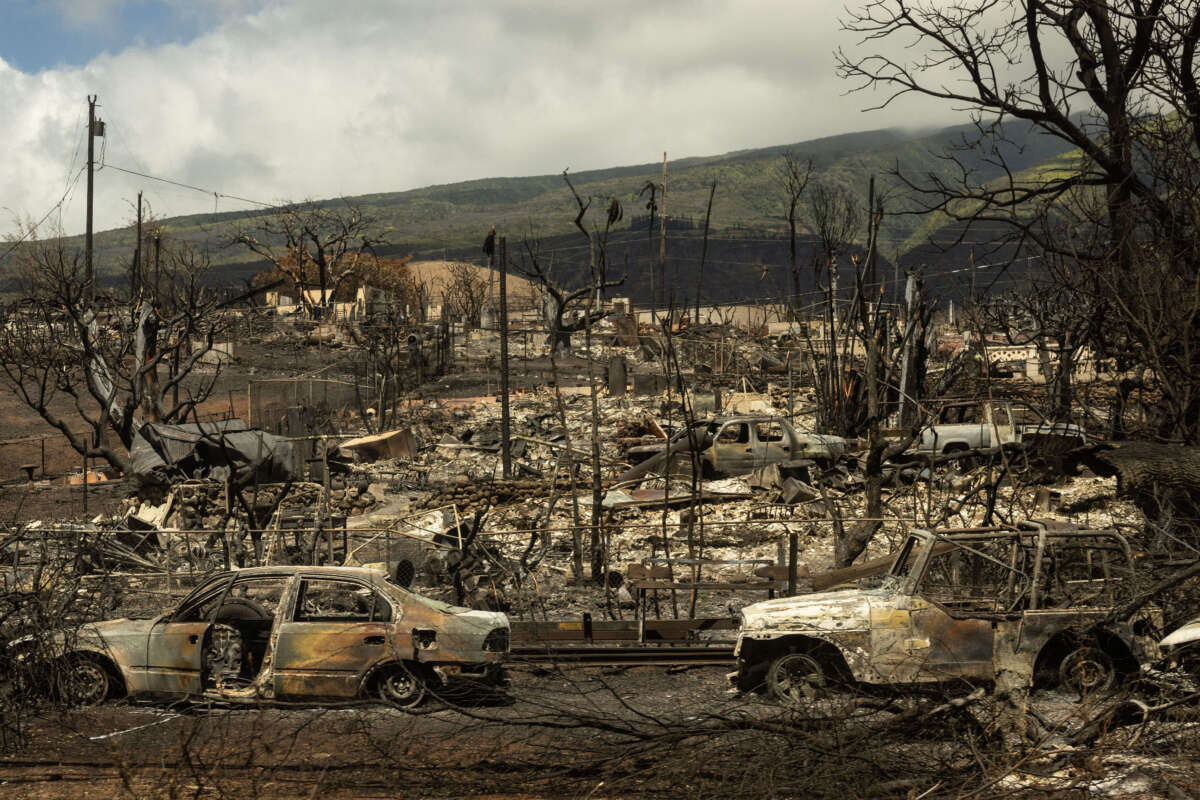Former President Donald Trump published a video message to the people of Hawaii on Monday, using the opportunity to make political digs at President Joe Biden and voicing skepticism over any suggestion that the climate crisis was partly responsible for the devastation.
“I would like to express my sympathy and warmest regards to the people of Hawaii,” Trump began his message, “and specifically all of those who have been so gravely and irreparably hurt by the tragedy of the wildfires in Maui, something the likes of which have seldom been seen anywhere at any time.”
Trump then shifted gears, saying the catastrophe “should never have happened,” that the government “was not prepared” to deal with the wildfires, and claiming the aftermath “is going very poorly.”
Trump attacked Hawaii Gov. Josh Green (D), opining that he wanted “to do nothing but blame [the wildfires] on global warming and other things that just popped into his head.” Trump also said that Biden responded to reporters over the weekend by saying, “with a laugh and a smile” that he had “no comment” on the situation.
Those reporters were trying to ask Biden questions as he was entering a vehicle. In truth, Biden responded to the crisis several days ago, both in words and in action.
“Jill and I send our deepest condolences to the families of those who lost loved ones in the wildfires in Maui, and our prayers are with those who have seen their homes, businesses, and communities destroyed,” Biden said on August 9, six days prior to Trump’s video message.
Biden also announced in that statement that he had “ordered all available Federal assets on the Islands to help with [the] response,” including the Hawaiian National Guard, the U.S. Coast Guard, and U.S. Navy fleets, to assist with “fire suppression and search and rescue on the Island of Maui.” The Army and the Department of Transportation were also ordered to help, and the Departments of Interior and Agriculture were on standby, Biden said
The following day, the president approved a federal disaster declaration for Maui.
White House Press Secretary Karine Jean-Pierre blasted criticisms of Biden on Monday. “When you talk about a dozen agencies on the ground, helping and assisting … hundreds of FEMA personnel. That’s what — that’s what matters,” Jean-Pierre said.
Trump’s belittling of the climate crisis as a catalyst for the wildfires disregards what several forestry and climate scientists have said about the situation.
The climate crisis is “leading to these unpredictable or unforeseen combinations that we’re seeing right now and that are fueling this extreme fire weather,” Kelsey Copes-Gerbitz, a researcher at the University of British Columbia’s faculty of forestry, said to The Associated Press last week.
Those who are saying the climate crisis played no role in the wildfires on Maui are wrong, Katharine Hayhoe, climate scientist and chief scientist at the environmental nonprofit organization, The Nature Conservancy, tweeted.
“Amid the devastating Maui fires, I see many arguing, ‘it’s weather, arson — anything but climate change.’ Let’s set the record straight. Climate change doesn’t usually start the fires; but it intensifies them, increasing the area they burn + making them much more dangerous,” Hayhoe explained.
“The massive winds, dry winds, are what drove this fire,” said Josh Stanbro, former chief resilience officer for the city of Honolulu. “This is part of a long-term trend that is directly related to climate changes and impacts on the islands.”
Ninety-nine deaths have been reported so far as a result of the wildfires near Lahaina, Maui, placing it in the middle of the top ten deadliest wildfires in U.S. history and the deadliest wildfire of the past century. Sadly, that number is expected to rise, as only 25 percent of the burn area in Maui has been searched so far.
Our most important fundraising appeal of the year
December is the most critical time of year for Truthout, because our nonprofit news is funded almost entirely by individual donations from readers like you. So before you navigate away, we ask that you take just a second to support Truthout with a tax-deductible donation.
This year is a little different. We are up against a far-reaching, wide-scale attack on press freedom coming from the Trump administration. 2025 was a year of frightening censorship, news industry corporate consolidation, and worsening financial conditions for progressive nonprofits across the board.
We can only resist Trump’s agenda by cultivating a strong base of support. The right-wing mediasphere is funded comfortably by billionaire owners and venture capitalist philanthropists. At Truthout, we have you.
We’ve set an ambitious target for our year-end campaign — a goal of $250,000 to keep up our fight against authoritarianism in 2026. Please take a meaningful action in this fight: make a one-time or monthly donation to Truthout before December 31. If you have the means, please dig deep.
